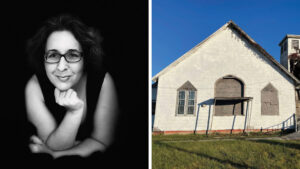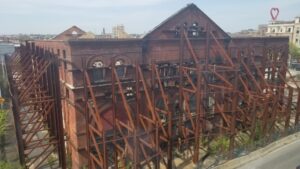Climate change activist Greta Thunberg, 16, recently made history by becoming the youngest person to ever be named Time magazine’s “Person of the Year.” Thunberg’s selection indicates the growing awareness and the ongoing international discussion about climate change.
While most people know the risks associated with climate change — and have heard that reducing food waste or using solar energy can reverse some of the damage to the environment — not everyone understands how to implement those changes into their daily lives.
Now, the Pearlstone Center in Reisterstown, an agency of The Associated: Jewish Federation of Baltimore, is rolling out a community program that allows Baltimore area residents to use solar energy in their homes.
“People are interested in using solar energy, but rooftop panels may not be a possibility,” says Joan Plisko, the community sustainability director at Pearlstone. “Our community solar program is a way for residents to invest in renewable energy without having to put solar panels on their roofs.”
To make this program feasible, Pearlstone has partnered with the Silver Spring-based Neighborhood Sun Solar company to ensure that Marylanders have access to clean energy resources. Currently, there are two projects available for Baltimore Gas & Electric customers, one on Dogwood Road near Woodlawn and one in White Marsh. While residents don’t need to live in those areas, they must be BGE customers to participate in the community solar program.
“The solar fields are connected to BGE’s larger electrical grids, so residents are still receiving power through BGE,” says Plisko. “When you sign up for Neighborhood Sun, you are specifying you want some of your power to be solar.”
There are a few dozen people currently signed up for Pearlstone’s community solar program, which is considered a win-win for users and the environment.
“Eighty percent of the market can’t put solar on their rooftops, and this is a way to reach them,” says Gary Skulnik, founder and CEO of Neighborhood Sun. “People ask what the catch is here, and there is none. The only catch is getting over the trust factor.
“This is a real, legitimate program that was started by legislation passed by the General Assembly and signed by the governor,” he says. “It’s a great program that guarantees you savings while cleaning up the environment in Maryland.”
Residents who sign up for the program can expect to see up to 10 percent cost savings on their energy bill, Skulnik says.
“Each month the project produces power, we tell BGE what your share of that power is,” he says. “BGE will put the credits back on your account as if you had a rooftop system, but this one is all virtual. The Community Solar Act, which was passed in 2015, made a program like this possible. Prior to that, we weren’t allowed to provide virtual credits, which is the mechanism that makes this work.”
Those participating in the program must commit to three years of using solar energy. However, there is no upfront fee or joining costs.
“I come to the fight against climate change because of my Jewish values of protecting the earth and protecting human life,” says Skulnik, who has been active in climate change and clean energy efforts in Maryland for 20 years. “We have an obligation to fix the various things that harm the planet for future generations. “
The community solar program is part of a larger Pearlstone initiative called the Sustainable Climate Change Campaign.
“We are in a climate crisis,” says Pearlstone CEO Jakir Manela. “We have a moral obligation as humans, as Americans and as Jews, to care for our children and God’s creation. More and more Jewish individuals, rabbis and organizations are seeing that it’s critical to implement a climate change campaign in order to avoid catastrophic consequences.”
In addition to community solar fields, Pearlstone is working with The Associated to find land to build a solar farm that would provide 50 percent of the energy to all Associated agencies and 75 percent of Pearlstone’s energy.
There is also the Green Loan Fund, which allows Jewish and other faith-based institutions in Baltimore to borrow money to implement energy-saving measures at their facilities.
“We have to move to a renewable energy community as fast as we can if we want to avoid the most dangerous impacts of climate change, “says Del. Dana M. Stein (D-11th), who sits on Pearlstone’s board. “Community solar is new, and it democratizes solar opportunities.”
For information, visit https://neighborhoodsun.solar/pearlstone-landing/





